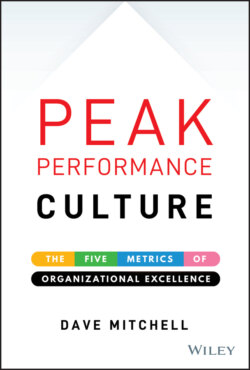Читать книгу Peak Performance Culture - Dave Mitchell - Страница 14
THE IMPORTANCE OF JOY
ОглавлениеI know all about desire. I have displayed it consistently throughout my career. It was desire, roughly synonymous with “possessing a high work ethic,” that drove my achievements in the corporate world. It was desire that pushed me to be a television producer for CBS at 22 years old. It was desire that provided the fuel for my journey to the top human resources executive for an international hospitality management company at age 33. But it was also desire that revealed this key revelation to me: desire is not enough to create enduring performance. In fact, desire without passion often results in burnout. It did with me.
I burned out three times. Until I learned the danger of desire without the balance of joy, I continued to succumb to stress. Desire is about effort. Passion is about joy. Effort is finite; joy is self‐renewing. My corporate career from 1983 to 1995 was like a twelve‐year course on the importance of passion.
By 1995, I had distilled the source of my joy to some very specific activities. I knew I loved educating. Specifically, I loved making people laugh while they learned about themselves, others, and their organization. The things that diverted my attention away from that focus were the things that robbed me of joy, diluted my passion, and resulted in me losing my desire. I feel fortunate to have arrived at this revelation at a relatively young age. As a result, I was able to nudge my career in a direction that better aligned with my passion.
Now, before you start to assume that passion for your vocation makes everything easy – it doesn't. Passion is the foundation for peak performance culture, but it is not the entirety of operational excellence. What passion provides is the building block from which all else can be constructed. It is the perpetual fuel source to deal with all the challenges that will ensue. As an example, after I speak at a large conference, I am often approached by an audience member who says, “I want to do what you do.” I take it as it is intended, as a compliment. They see my passion and want to experience what it would be like to feel that way about a job. However, there is a lot more than passion necessary to success. One must have talent, a vision, a strategy, processes, commitment, resiliency, and so on. People see me on the stage. They don't see me in the airport at 4:00 a.m. or writing a proposal on an airplane or doing a conference call in a hotel at 7:00 p.m. They don't imagine the travel schedule, the performance pressure, the revenue generation responsibilities, and all the other tasks – both small and large – that surround the moment of passion. That is why passion is so important to peak performance culture. Without it, no amount of desire can offset the eroding effect of drudgery. But with passion, no amount of drudgery is too great to overcome.
You may be asking yourself, “What is my passion?” How does one identify the core values within oneself that can light the fire of joy and keep it lit over time? In my book The Power of Understanding Yourself, I explain the metacognitive journey to discover your core ideology, your interactive style preferences, and your values. The clues to your passion certainly lie within the discovery of your purpose and orientation. My core ideology is “to contribute to a loving, happy, and secure family while maintaining my freedom – economically and philosophically – through the facilitation of knowledge and transfer of learning, all for the purpose of being a positive and joyful influence on others.” To achieve the level of passion I need to create a high‐performing organization and sustain my own personal commitment; my contribution must align with my core ideology. Otherwise, it would bring me no joy. And without joy there can be no passion.
